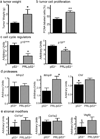Prolactin cooperates with loss of p53 to promote claudin-low mammary carcinomas
- PMID: 23873024
- PMCID: PMC4007359
- DOI: 10.1038/onc.2013.278
Prolactin cooperates with loss of p53 to promote claudin-low mammary carcinomas
Abstract
TP53 is one of the most commonly mutated genes in cancer. In breast cancer, it is mutated in about 40% of primary clinical tumors and is associated with poor survival. The mammotrophic hormone, prolactin (PRL), and/or its receptor are also expressed in many breast cancers, and accumulating epidemiologic data link PRL to breast cancer development and progression. Like TP53 mutations, evidence for PRL activity is evident across several molecular cancer subtypes, and elevated PRL expression and loss of p53 have been observed in some of the same clinical tumors. In order to examine the interaction of these factors, we used genetically modified mouse models of mammary-specific p53 loss and local overexpression of PRL. We demonstrated that mammary PRL decreased the latency of tumors in the absence of p53, and increased the proportion of triple-negative claudin-low carcinomas, which display similarities to human clinical metaplastic carcinomas. Moreover, PRL/p53(-/-) carcinomas displayed higher rates of proliferation and more aggressive behavior. Transcripts associated with cell cycle progression, invasion and stromal reactivity were differentially expressed in carcinomas that developed in the presence of elevated PRL. PRL/p53(-/-) carcinomas also exhibited selectively altered expression of activating protein-1 components, including higher levels of c-Jun and FosL1, which can drive transcription of many of these genes and the epithelial-mesenchymal transition. The ability of PRL to promote claudin-low carcinomas demonstrates that PRL can influence this subset of triple-negative breast cancers, which may have been obscured by the relative infrequency of this cancer subtype. Our findings suggest novel therapeutic approaches, and provide a preclinical model to develop possible agents.
Conflict of interest statement
The authors have nothing to disclose.
Figures




References
-
- Sorlie T, Perou CM, Tibshirani R, Aas T, Geisler S, Johnsen H, Hastie T, Eisen MB, van de Rijn M, Jeffrey SS, Thorsen T, Quist H, Matese JC, Brown PO, Botstein D, Lonning PE, Borresen-Dale AL. Gene expression patterns of breast carcinomas distinguish tumor subclasses with clinical implications. Proc Natl Acad Sci U S A. 2001;98:10869–10874. - PMC - PubMed
-
- Jackson JG, Lozano G. The mutant p53 mouse as a pre-clinical model. Oncogene. 2013 - PubMed
-
- Jerry DJ, Kittrell FS, Kuperwasser C, Laucirica R, Dickinson ES, Bonilla PJ, Butel JS, Medina D. A mammary-specific model demonstrates the role of the p53 tumor suppressor gene in tumor development. Oncogene. 2000;19:1052–1058. - PubMed
Publication types
MeSH terms
Substances
Grants and funding
LinkOut - more resources
Full Text Sources
Other Literature Sources
Molecular Biology Databases
Research Materials
Miscellaneous

